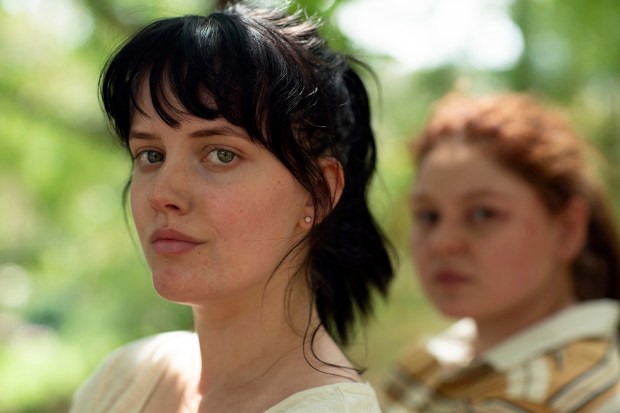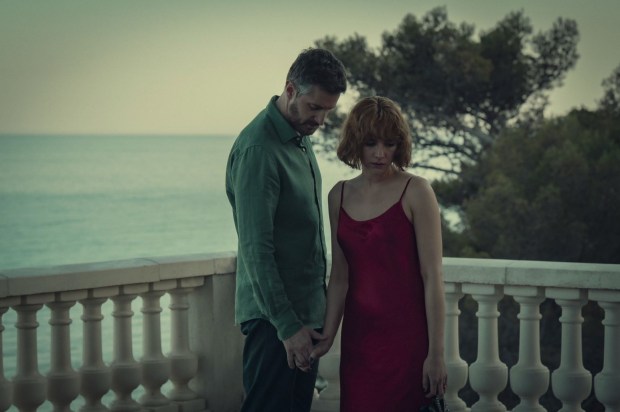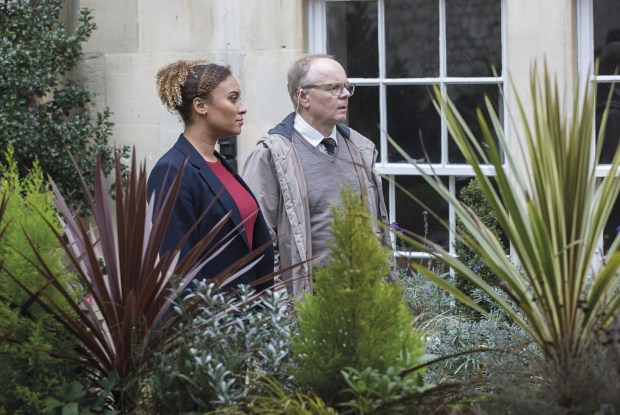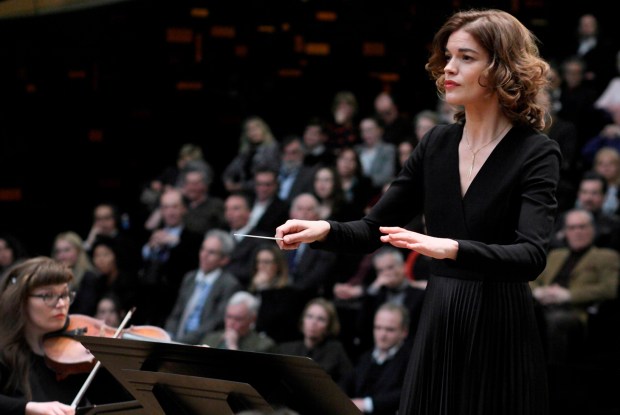By my calculations, the remake of Poldark (BBC1, Sunday) is the first time BBC drama has returned to Cornwall since that famously mumbling Jamaica Inn — which may explain why even the lowliest yokel here tends to project from the diaphragm. Leading both the cast and the diaphragm-projection is Aidan Turner as Ross Poldark, initially seen as a British Redcoat in a wood rather unconvincingly captioned ‘Virginia, America, 1781’. The short scene that followed efficiently established that he had a rackety past and some politically radical ideas, before the American rebels attacked, leaving several extras dead. Ross himself suffered injuries bad enough to bring on a severe case of flashback, as he deliriously remembered how he and a wild-haired woman used to run about the Cornish cliffs in slow motion while laughing a lot and swearing eternal love.
And with that, we cut to Cornwall two years later, where Ross’s homecoming wasn’t going terribly well — what with his father being dead, the family estate bankrupt, the family tin mines flooded and that wild-haired woman not only immaculately coiffured, but also engaged to somebody else in the belief that Ross was dead. No wonder that for a while he stuck to a rigid regime of staring moodily out to sea.
The new Poldark has a strong supporting cast, including the much-missed Warren Clarke doing his gruff no-nonsense act one last time as Ross’s Uncle Charles. Even so, at this stage, the programme appears to be pinning most of its hopes on Aidan Turner’s sex appeal — which, let’s face it, is not an especially risky strategy. Certainly, Turner can brood with the best of them. He’s also good at that thing women seem to like: constantly alternating between being nice and being horrible. It’s a policy he applies to his servants (a married couple who bear a striking resemblance to Master and Mistress Ploppy, those jailers from Blackadder II); to his old flame Elizabeth (who’s apparently still pining for him — not surprisingly, given that her fiancé might as well have the words ‘Dull Dog’ embroidered across his tricorn hat); and to Demelza, a local girl whom, during one of his nice phases, he rescued from some bullies and installed as his kitchen maid.
On the whole, the rest of the programme proved as efficient as that opening scene. The main characters were introduced, the historical background was deftly sketched in and there were at least two pretty decent fights. So far, though, the new Poldark hasn’t really caught fire.
One obvious reason is that Sunday’s opener never solved the problem that first episodes of British dramas so often set themselves: how to make the central dilemma feel properly engaging when we know how it needs to turn out for the series to exist at all. In this case, the question was whether Ross would stay in Cornwall or give up the ghost and head to a new life in London. Despite the best efforts of all concerned, there was naturally no doubt what the answer would be.
But perhaps there’s something else too. We won’t know for sure until next week, but Poldark does have a strong whiff of drama-by-committee about it: not just in the decision to remake a much-loved old show, but also in the somewhat nervously respectful way it’s going about the task. The result is duly solid rather than spectacular — although of course I may be reckoning without the Turner effect…
BBC2’s Nurse (Tuesday), by contrast, hit its stride immediately. (Admittedly, it started as a radio series, which must help.) The plot doesn’t take long to summarise: a community psychiatric nurse goes from house to house visiting her ‘service users’ — i.e. patients — to see how they’re doing. Mostly played by Paul Whitehouse, who also co-wrote the programme, these include an ex-con agoraphobic, a morbidly obese man whose mother prides herself on feeding him up and a cultured elderly schizophrenic unable to understand why W.B. Yeats isn’t returning his letters — and reluctant to take his medication, because ‘Without my voices, there’s no one to talk to.’
As the premise for a comedy show, this mightn’t sound enormously promising. Yet, while the result mightn’t have you falling off the couch in mirth, there are plenty of neat gags, often but not always made by the patients at their own expense. What’s really striking about Nurse, though, is the emotional punch it provides, especially when the characters are having one of their moments of rueful self-knowledge.
Crucially, too, the tone is perfect: warmly sympathetic, but never sentimental; willing to laugh at the madder forms of madness, but never to mock them. And all this, almost miraculously, without any tangible sense of calculation. I ended Tuesday’s programme feeling, not for the first time, that there’s a distinct touch of genius about Paul Whitehouse.
Got something to add? Join the discussion and comment below.
Get 10 issues for just $10
Subscribe to The Spectator Australia today for the next 10 magazine issues, plus full online access, for just $10.
You might disagree with half of it, but you’ll enjoy reading all of it. Try your first month for free, then just $2 a week for the remainder of your first year.














Comments
Don't miss out
Join the conversation with other Spectator Australia readers. Subscribe to leave a comment.
SUBSCRIBEAlready a subscriber? Log in